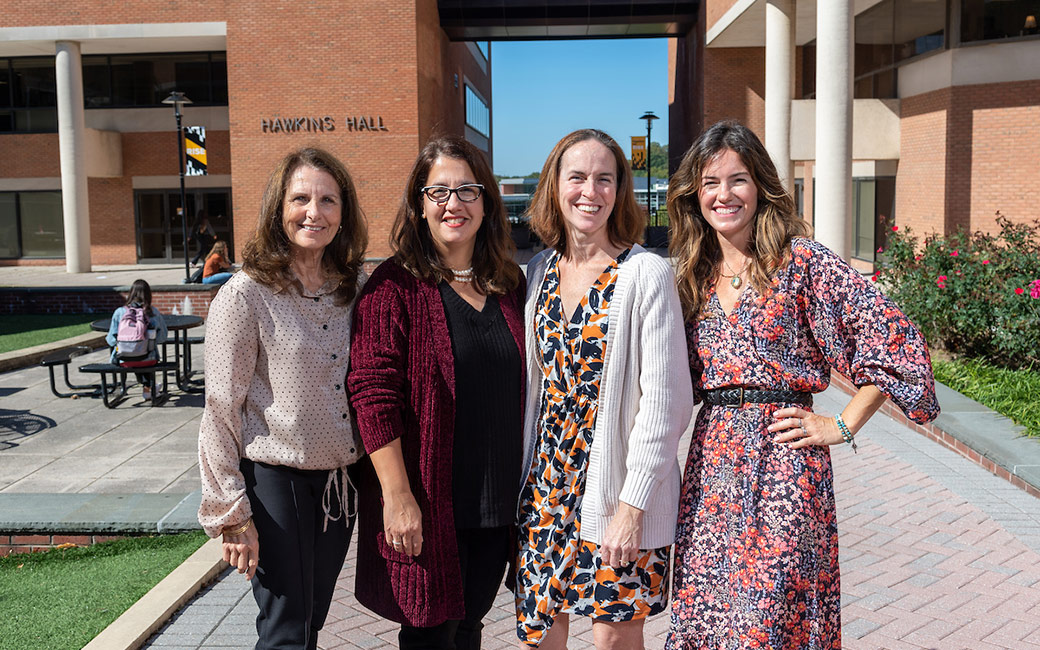TU awarded $3.8M in federal funds for teacher preparation
U.S. Department of Education grants aim to improve educators’ work with English language learners, students with autism
By Rebecca Kirkman on October 24, 2021

This fall, faculty in the Towson University College of Education (COE) and College of Health Professions (CHP) were awarded grants totaling $3.8 million from the U.S. Department of Education (USDE) to prepare pre-service and in-service teachers of special education students.
A leader in education for more than 150 years, Towson University provides scholars with a collaborative, interdisciplinary atmosphere alongside a commitment to advancing the public good. TU alumni are transforming education in Maryland school systems and beyond.
To support the university’s preparation of educators, including those who teach English for speakers of other languages (ESOL), the USDE Office of English Language Acquisition awarded Towson University $2.7 million over five years for Enhancing Literacy for English Learners: Valuing Assets Through Engagement (ELEVATE).
“As the diversity of Maryland grows, we must dedicate federal resources to enhancing learning programs that serve the entire student population,” said U.S. Rep. John Sarbanes, D-Md., in a press release. “This federal funding, awarded to the respected education program at Towson University, will prepare teachers and education specialists with the qualifications and skills they need to help the next generation of English learners succeed in the classroom.”
Helmed by principal investigator (PI) Patricia Rice Doran, an associate professor in the Department of Special Education, ELEVATE builds on strong existing partnerships and resources to improve instruction and promote literacy for English learners with special needs. Gilda Martinez Alba, assistant dean, and Elizabeth Neville, department chair and professor of special education, serve as co-PIs for the grant, alongside evaluator and assistant professor of special education Gregory Knollman.
Specifically, funding will support coursework and training activities enabling 96 TU education students and 32 in-service teachers to receive ESOL endorsement. The funding also supports training for an additional 100 school staff members and 100 family members per year.
The grant builds on a previous five-year, federally funded project, EMPOWER, in which TU partnered with Anne Arundel County Public Schools (AACPS) and AACPS’ largest contract school operator, the Children’s Guild. ELEVATE builds on these partnerships with an additional focus on literacy.
“It really brings together literacy and ESOL,” says project director Danielle Turner ’09, ’19. “As a graduate of the reading education master's program, I'm a big fan of the new grant tapping into that asset of the program we already have and pairing it with the certification in ESOL.”
Don't let data worries keep you from Twitter.
— Twitter (@Twitter) August 13, 2018
https://t.co/vt2K81Cnf3
In addition to combining two of the college’s strengths—teacher preparation in literacy and ESOL—the program also draws on the university’s emphasis on student-centered learning.
“The grant emphasizes valuing assets through engagement,” says Doran. “TU does this really well. Looking at our students through an asset-focused lens, that's a starting point for providing them the support they need to soar.”
A second project, which develops an interdisciplinary partnership between COE and CHP, received $1.1 million from the USDE Office of Special Education Programs.
Project LINC: Preparing School-Based Leaders in ASD through Interdisciplinary Networking and Shared Competencies, will increase the number of diverse scholars in special education and speech-language pathology who are highly qualified to meet the needs of school-age students with autism spectrum disorder (ASD).
“Our greatest hope is that Project LINC directly improves school-based special educators’ and speech-language pathologists' ability to lead other school-based professionals in collaborating and implementing evidence-based practices that have a positive impact on students with ASD's educational and life outcomes,” says Katherine Holman, an associate professor in the Department of Special Education and PI for Project LINC.
“We want graduates from our program to model holistic understanding and appreciation for the lived experiences of autistic adults and know how to partner with and empower families to focus on the individual's desires when planning for a full and vibrant life post-secondary education,” she adds.
With co-PIs Knollman and Kaitlyn Wilson, associate professor in the Department of Speech-Language Pathology & Audiology, Holman designed the project to address the national shortage of special educators and speech-language pathologists and the evidence that school-based professionals have limited training and experience in interdisciplinary, evidence-based practices for students with ASD.
“The supplementary training program we are developing as part of Project LINC will enhance the existing speech-language pathology and teacher as leader in ASD graduate programs by providing hands-on opportunities for interdisciplinary collaboration and implementation of evidence-based practices for students with ASD,” Holman adds. “We will also design opportunities for interdisciplinary research among the scholars.”